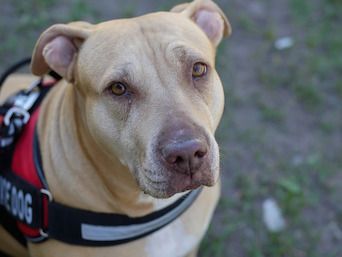Attachment Style and Quality of Life in Assistance Dog Owners
Researchers in the United Kingdom explore the nature of attachment between people and their assistance dogs.

Psychologists use attachment theory to describe the types of bonds people develop toward attachment figures such as parents, romantic partners, or even pets. Attachment styles in adults can be classified generally as secure, anxious (needing to be close to the attachment figure), or avoidant (wanting to maintain emotional distance).
In a study published recently in the International Journal of Environmental Research and Public Health, researchers examined 2 insecure attachment styles—anxious and avoidant—in owners of assistance dogs. The results suggest that in these owners, anxious attachment is associated with a better quality of life.
Few studies have reported the relationship between type of attachment to a pet and quality of life, say the authors. One previous study indicated that higher attachment anxiety was related to lower psychological well-being in pet owners.
The types of bonds people develop to assistance dogs may differ from those of the general pet-owning population, say the authors. “The impact of dog ownership on quality of life may be greater for assistance dog owners than pet dog owners,” they write. “The reciprocal caregiving occurring between an assistance dog and owner is a particularly strong feature of the relationship between these two.”
The investigators sent pet attachment and quality of life questionnaires to adult dog owners listed in the database of Dogs for Good, a UK charity that provides assistance dogs to people with a variety of disabilities. The researchers received completed questionnaires from 73 participants.
The analysis indicated that anxious attachment significantly predicted quality of life. As anxious attachment scores rose, quality of life scores also increased. The results suggest, say the authors, that “for assistance dog owners anxious attachment has a positive effect on perceived quality of life.”
Mean scores on the avoidant attachment scale were lower than those for anxious attachment, almost as low as the scale allows. This result shows that avoidant attachment “is not a feature of the attachment bond between the owner and dog” among participants in this study, write the authors.
The results of this study are opposite those of the study showing that anxious attachment to a pet decreases quality of life. The authors suggest possible reasons for the discrepancy: cultural differences (the study of pet dog owners was conducted in Israel), sample size difference (the UK study was smaller), and inherent differences in the nature of attachment to pets and attachment to assistance dogs.
Attachment anxiety in pet dog owners may reflect either general worry for the pet’s welfare or anxiety produced by the pet’s problem behavior, say the authors. Assistance dog owners, on the other hand, may have access to more robust general support for dog ownership, and their dogs should not have behavior problems.
The authors also note that anxious attachment may reflect the reliance owners place on assistance dogs and the degree to which these dogs improve their owners’ independence. “In this context,” they write, “the anxious attachment is the inevitable cost of awareness of the benefits derived from an assistance dog, but may be framed in a more positive way so it does not negate the quality of life benefits of owning the dog.”
“This study represents an important first step for exploring how the relationship between owner and assistance dog affects well-being outcomes,” they conclude. Their results suggest, they say, that the association between attachment style and quality of life depends on the individual and the context of the relationship.
Dr. Laurie Anne Walden received her doctorate in veterinary medicine from North Carolina State University. After an internship in small animal medicine and surgery at Auburn University, she returned to North Carolina, where she has been in small animal primary care practice for over 20 years. Dr. Walden is also a board-certified editor in the life sciences and owner of Walden Medical Writing, LLC. She works as a full-time freelance medical writer and editor and continues to see patients a few days each month.